Postal address: Hälsouniversitetet, SE-581 83 Linköping, Sweden
Visiting addresses: Sandbäcksgatan 7, Linköping & Dragsgatan 7, Norrköping
Web page: http://www.hu.liu.se/?l=en
Contact person: Ingrid Mignon, International Programmes Manager, phone: +46 (0)13 221690
The Faculty of Health Sciences, located at both Linköping and Norrköping, offers undergraduate programmes for health and social care. The Faculty also offers an opportunity to study a medical scientific programme in medical biology. It also has a comprehensive International contact network with partnership universities in many parts of the world, and has signed bilateral exchange agreements with a number of universities around the world.
The Faculty of Health Sciences is also an active member of the World Health organisation’s (WHO) programme The Network: Towards Unity for Health, a global network of health universities.
South Asia related cooperation:
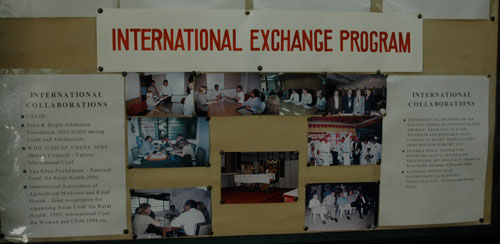 During the period 2000–2008, the Faculty of Health Sciences was involved in extensive collaboration with Pravara Institute of Medical Sciences in Loni, Ahmednagar District, Maharashtra State, India. The collaboration started within the framework of the Linnaeus-Palme International Exchange Programme that included a mutual exchange of staff and students in the field of medical care, medical education and research. More information about the Linnaus Palme Exchange programme.
During the period 2000–2008, the Faculty of Health Sciences was involved in extensive collaboration with Pravara Institute of Medical Sciences in Loni, Ahmednagar District, Maharashtra State, India. The collaboration started within the framework of the Linnaeus-Palme International Exchange Programme that included a mutual exchange of staff and students in the field of medical care, medical education and research. More information about the Linnaus Palme Exchange programme.
The priority areas of interest for exchange programmes were 1) Problem Based Learning (PBL) teaching methodology 2) Advanced Neonatal Care Services 3) Paediatric Cardiac Surgery service 4) Cancer Dignostic techniques 5) Rehabilitation of disabled and 4) Research Methodology. Several faculty members were exchanged from the two institutions, and the Pravara Medical Trust, Loni has also received a number of students from Sweden.
Besides this the University of Linköping cooperated with the Pravara Medical Trust beyond its technical collaboration by donating medical equipment to strengthen the Paediatric Cardiac surgery Unit and Neonatology Unit of the Hospital at Loni.
The genesis of Pravara Medical Trust was a part of promotive efforts for an Integrated Rural Development Model (widely known as PRAVARA MODEL) to break the interlinked forces viz., Poverty Illiteracy, Disease and Inertia, through a co-operative venture with a motive of social justice. The Organisation was founded by late Padmashri Dr. Vithalrao Vikhe Patil, who was a simple, modest ordinary peasant, in 1972 with like minded people of national and international repute, as a primary concern to provide comprehensive health care services to the rural poor and disadvantaged who were suffering greatly due to the lack of qualified medical help in this remote rural part of Maharashtra.
The universities perceived a intense collaboration for 10 years, but it was completed in 2008.
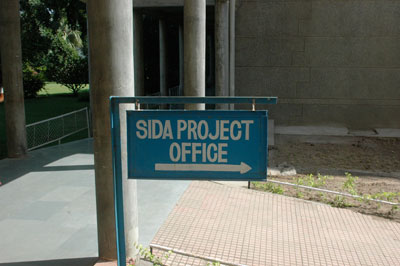 Swedish government support to Pravara project
Swedish government support to Pravara project
In March 2005 the Swedish Government decided on a new country strategy for India for the period 2005-2009. The strategy implied a new kind of co-operation between Sweden in India mainly focusing on technical assistance and building partnerships of mutual interests between Swedish and Indian actors. The focus areas were: Respect for democracy and human rights; Environmental protection that will benefit the poor; and Scientific cooperation in selected areas that will benefit the poor.
In light of the comparative advantage that Sweden has in Sexual and Reproductive Health & Rights, Children’s Rights and HIV/AIDS, the Swedish International Development Cooperation Agency, Sida, therefore supported and allocated funds to a number of projects and partnerships involving Swedish universities.
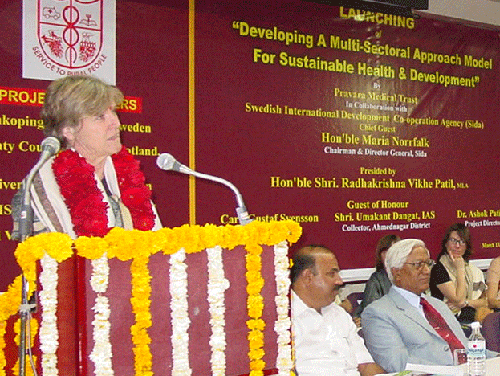 One of these projects being funded by Sida became the existing collaboration between Pravara Institute of Medical Sciences; the Faculty of Health Sciences, University of Linköping, and the University Hospital in Linköping/County Council of Östergötland to promote health care, and with the School of Life Sciences at Skövde University in the areas of biotechnology, biomedicine, molecular biology and genetic engineering.
One of these projects being funded by Sida became the existing collaboration between Pravara Institute of Medical Sciences; the Faculty of Health Sciences, University of Linköping, and the University Hospital in Linköping/County Council of Östergötland to promote health care, and with the School of Life Sciences at Skövde University in the areas of biotechnology, biomedicine, molecular biology and genetic engineering.
The project was completed in March 2010.
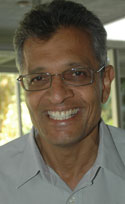 The collaboration was based upon long-standing development assistance work carried out in Loni, 300 km east of Mumbai, by the Pravara Rural Education Society established in 1964 by Late Padmashri Dr. Vithalrao Vikhe Patil.
The collaboration was based upon long-standing development assistance work carried out in Loni, 300 km east of Mumbai, by the Pravara Rural Education Society established in 1964 by Late Padmashri Dr. Vithalrao Vikhe Patil.
His descendant, microbiologist Ashok Patil (photo to the left) has a family connection to Sweden and stays part of the year in Skara. Dr. Patil is Pro-Vice-Chancellor of the Pravara Institute for Medical Sciences Deemed University, and is also the first Indian to become a President of the International Association of agricultural Medicine and Rural Health (IAAMRH). He is the key person behind the collaboration on the Indian side. More information about Dr. Patil.
The partnership encompasses joint academic and clinical activities, student-faculty-staff exchange programme and collaborative research. The project has been titled ”Developing a multi-sectoral approach model to sustainable health and development through institutional collaboration between India and Sweden”, and was given SEK 5 million as a Sida contribution for the period December 2005 – June 2009. The project was formally launced on 13 March 2006, when Maria Norrfalk, Director General of the Swedish Development Co-operation Agency visited the new partnership project run by Pravara Medical Trust and its Swedish partners (see photo from Ms. Norrfalk’s visit to the right).
Project description: The project will facilitate the expansion of the existing partnerships and further address the health issues in a holistic/multi-sectoral approach. Project brief Through the partnerships and a multi-sectoral approach to sustainable health and development that is inclusive of health, education, social welfare, agriculture, e-health and biotechnology, the PMT – along with a number of NGOs and the local government, shall attempt to adapt Sweden’s gender-sensitive health-care model (mödravårdscentral, barnavårdscentral) in the underserved areas in India, and also link and feed-in the benefits from their work related to Information and Communication Technology (ICT) and biotechnology.
On the other hand, the Swedish partners, apart from contributing to the quality development of the model, shall benefit from the experiences of rural India and gain to learn first hand about the tropical diseases. Also mutual learning from development of operational research – both qualitative and quantitative in areas jointly defined as important and relevant both from a community and a scientific perspective. The major intervention of the model include i) Delivery of decentralized, integrated and effective routine and specialized reproductive and child health services, ii) Raise awareness for behavioural changes and organize empowerment activities at individual and community level with regard to health, environment, gender equity, SRHR of youth and HIV/AIDS, iii) Applied research in biotechnology for promotion of nutrition, low cost herbal remedies, transgenic plants, and eco-friendly agriculture practices; and iv) e-health network for empowerment, capacity building and delivery of health care services for remote rural and tribal areas.
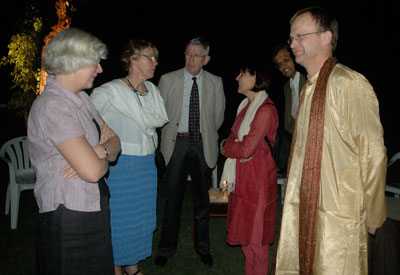 In November 2007, SASNET’s Director Anna Lindberg and Deputy Director Lars Eklund visited the Pravara Institute of Medical Sciences – Deemed University in Loni, Maharashtra. They met with the Vice Chancellor Prof. Ashok Patil, and a programme was prepared by Dr. Sanjeev G. Kulkarni, Associate Professor in Microbiology.
In November 2007, SASNET’s Director Anna Lindberg and Deputy Director Lars Eklund visited the Pravara Institute of Medical Sciences – Deemed University in Loni, Maharashtra. They met with the Vice Chancellor Prof. Ashok Patil, and a programme was prepared by Dr. Sanjeev G. Kulkarni, Associate Professor in Microbiology.
During their visit Anna and Lars met with a visiting team from the Faculty of Health Sciences in Linköping, including Prof. Orvar Finnström, Department of Paediatrics, Dr. Siw Alehagen, Dept. of Medical and Health Sciences; and Dr. Anna-Karin Johansson, Division of Nursing Science.
They reported that up till then, a total number of sixty Swedish students and many teachers have done fieldwork in Pravara; and thirty-seven students and several faculty members from Pravara have visited Linköping.
Read the full SASNET report from Pravara Institute of Medical Sciences.